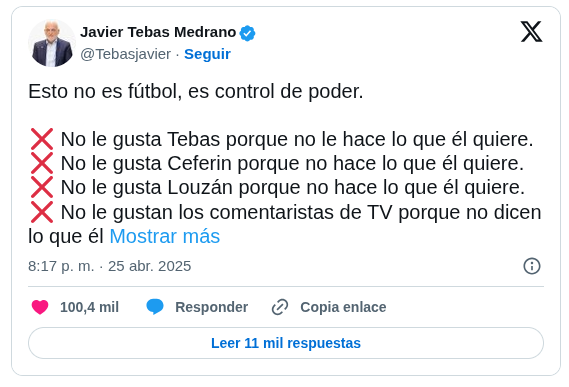While on April 25, 2025, Javier Tebas exploded on social media over the “outrageous” behavior of Real Madrid in the Copa del Rey final —because they skipped a press conference, a training session, and a dinner— today, just a few months later, the same Tebas is taking down thousands of websites in Spain… and those who should be speaking, are silent. And they’re silent for good reason.
Back then, the president of LaLiga was making grandiose statements with the indignation of an angry Twitter user: Madrid “doesn’t protest, it pressures. It doesn’t disagree, it punishes. It doesn’t want to improve football, it wants its football.” Grandiloquent words, of course, to describe symbolic gestures.

But now Tebas has gone from punishing Madrid… to punishing an entire country.
Since La Liga kicked off in August, the same pattern we’ve seen since February has repeated every weekend: training sites, online stores, academies, forums, appointment-based services… they all fall in droves, as if they were digital pirates, when in fact they are completely legal businesses. Their crime? Sharing infrastructure with a “suspicious” website or appearing on some automated blacklist that no one can review, question, or understand. A poorly fine-tuned algorithm, hungry for innocent blood, with the blessing (or willful ignorance) of the Ministry of Digital Transformation, Red.es, and the Digital Observatory.
All of this under the guise of a “sports protection plan.” Because apparently, protecting football now involves ruining freelancers, SMEs, and families.
And the Government? And Pedro Sánchez? Absolute silence. No one knows, no one answers. As if depriving thousands of small businesses of their income were an acceptable cost to keep the president of La Liga happy. Meanwhile, entrepreneurs and workers watch as their websites disappear for hours every match day, with no explanation, no warning, and no accountability.
And of course, Tebas, always so transparent, has the “decency” to call these businesses criminals directly on his official website. Because the worst part is that when there’s football, some operators, without hesitation, don’t just block access to the affected websites—they even place a banner on the domains, with a message as warm as “this website has been blocked by court order.” And as if that weren’t enough, they provide a direct link to La Liga’s official website, where they dedicate words that, in any other context, could be considered defamation. In this corner of the internet, businesses aren’t just “digital criminals”; they seem to be the worst of the worst, with a catalog of insults that you wouldn’t find in the worst action movies.
And here’s the most unsettling (or perhaps the most shameless) part: What’s the president of a private sports association like La Liga doing accompanying the president of the Government to China on an official visit? On what grounds is Tebas negotiating on behalf of Spain? And what did he bring back in his suitcase? Well… it seems we’re already seeing the results.
Because, coincidentally, after that trip, the machinery of digital censorship accelerated. On December 18, 2024, the Commercial Court No. 6 in Barcelona, under Judge César Amabilio Suárez Vázquez — who surely knows a lot about commercial and insolvency law, but let’s say he hasn’t gotten past his router when it comes to understanding the internet — authorized La Liga to block IPs broadcasting pirated football. Up to that point, fine. In theory, the ruling clarifies that it shouldn’t affect third parties. But, as expected, when the first blocks started, alarms went off.
Those who truly understand the issue, like RootedCON, Cloudflare, and other network experts, raised their hands with technical arguments. The judge’s response? Immediate dismissal. After all, there was a league match, and it wasn’t time to miss it just for reading papers. Because here, digital justice follows La Liga’s match schedule.
Maybe that was the trade-off: more power, more control, more impunity. And in the meantime, the same old speech: “protecting football.” Even if it means destroying half of the internet, suffocating businesses that have nothing to do with piracy, and leaving thousands of families without income.
On April 25, Tebas was talking about “control of power” when referring to Real Madrid. But now we know who was taking notes that day… and writing the entire script.
To be continued…



